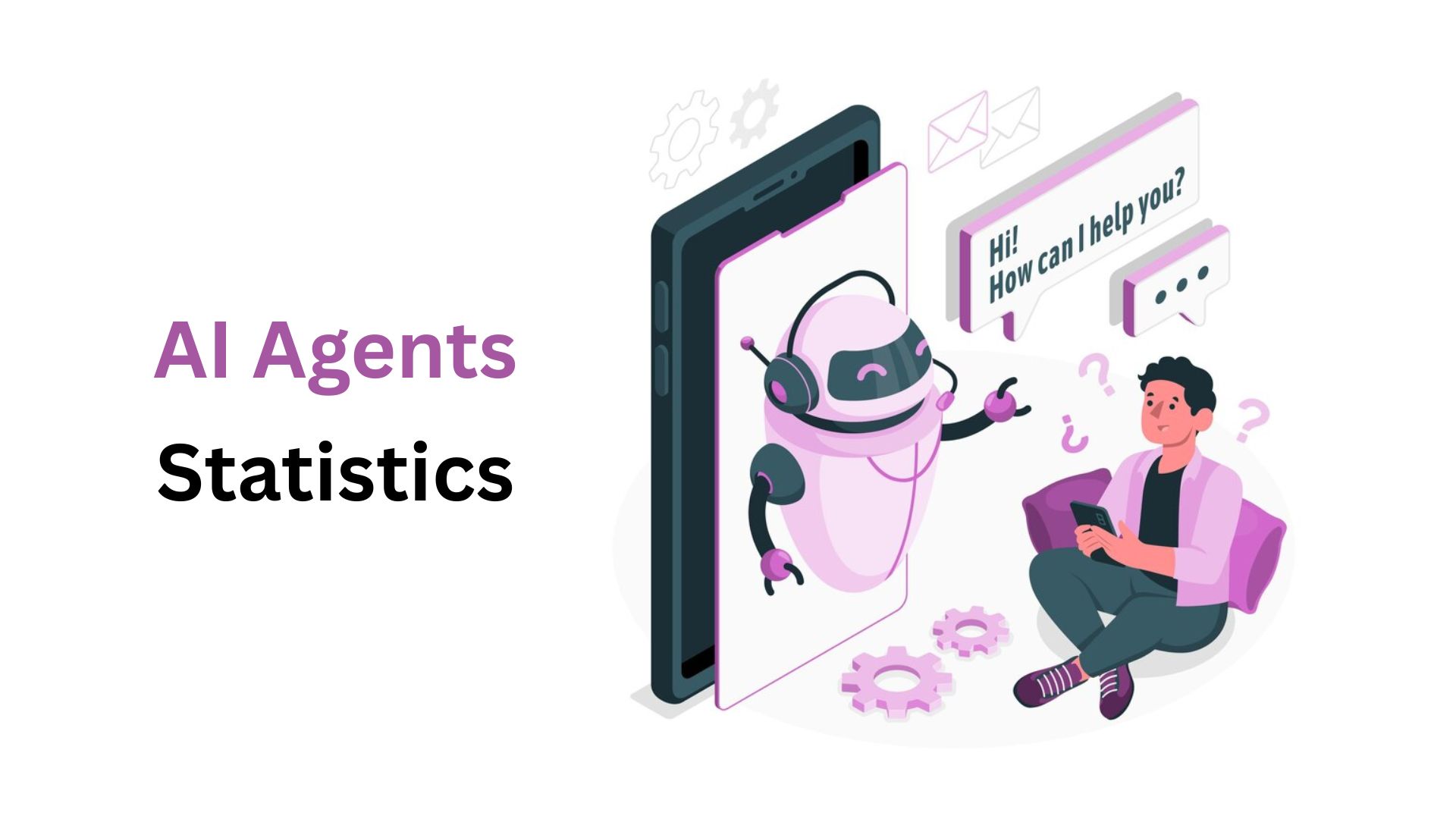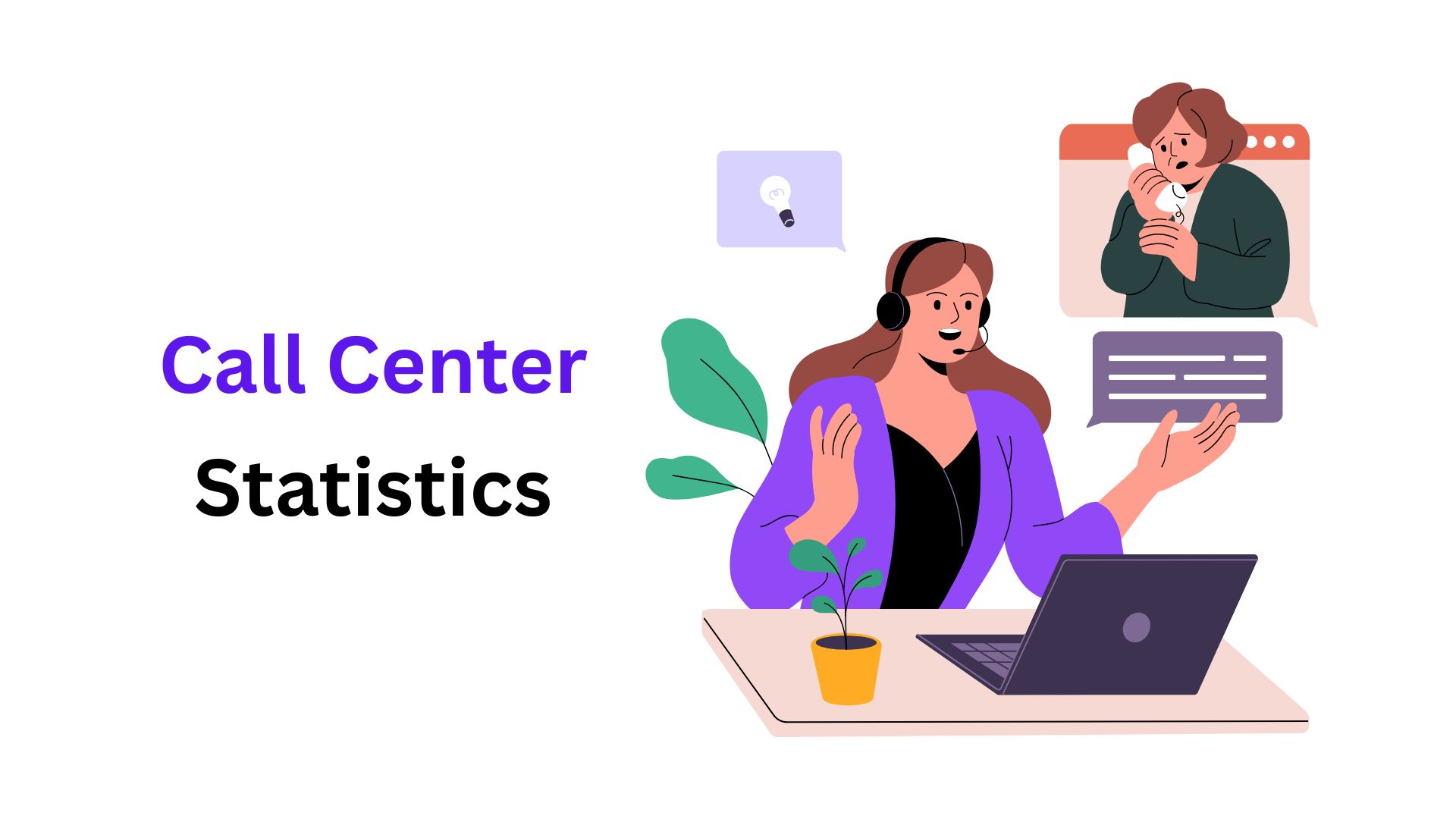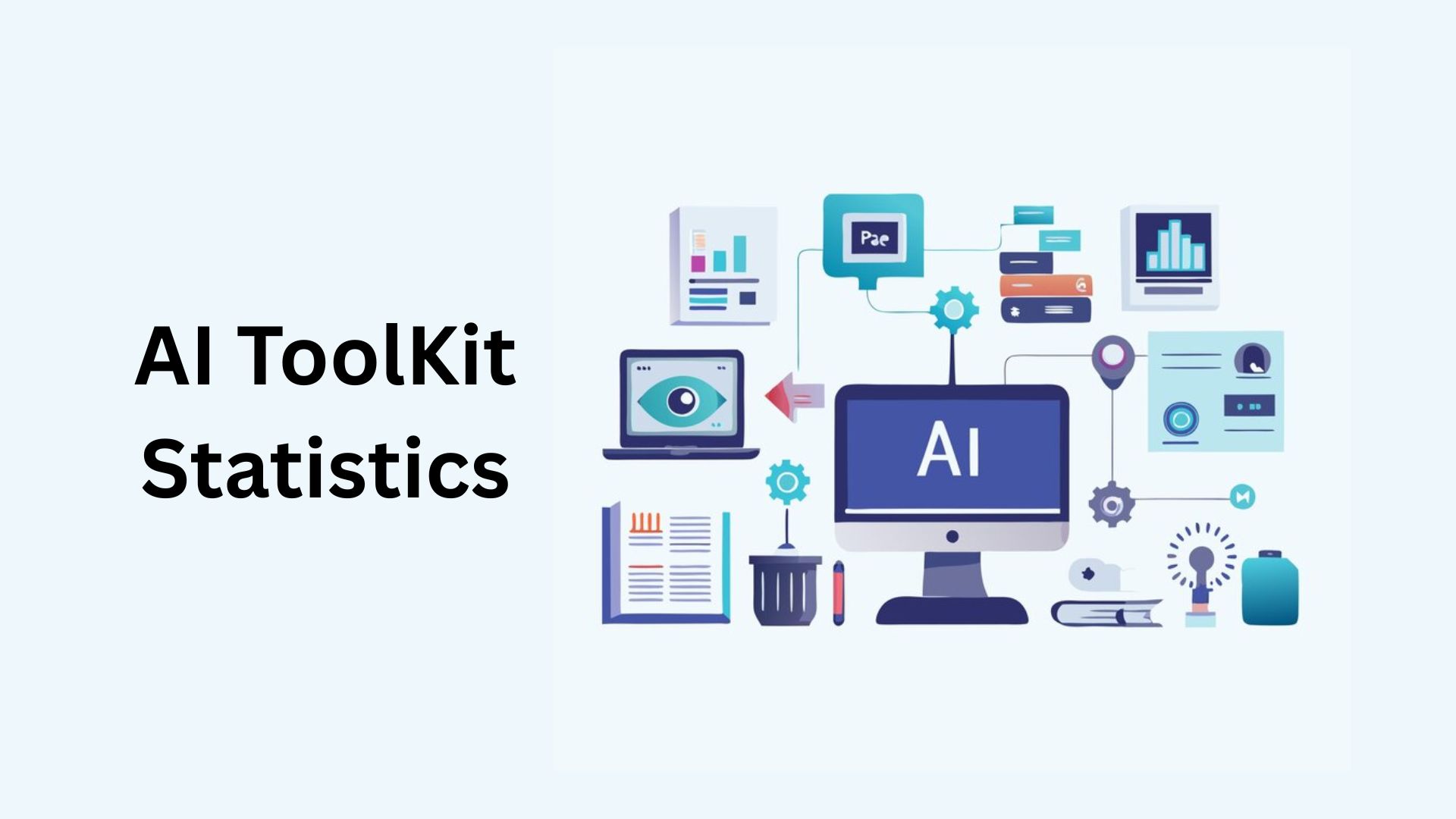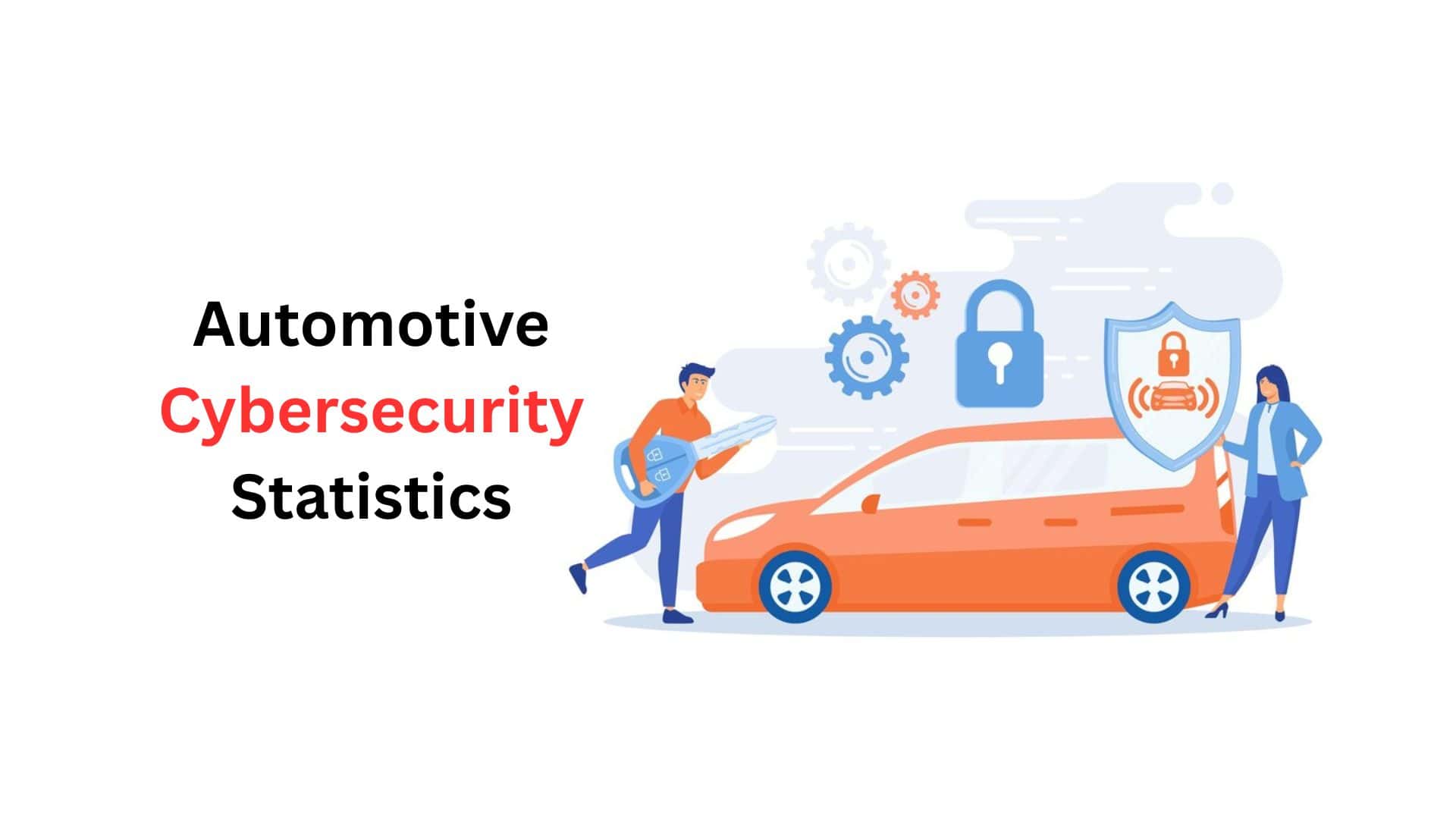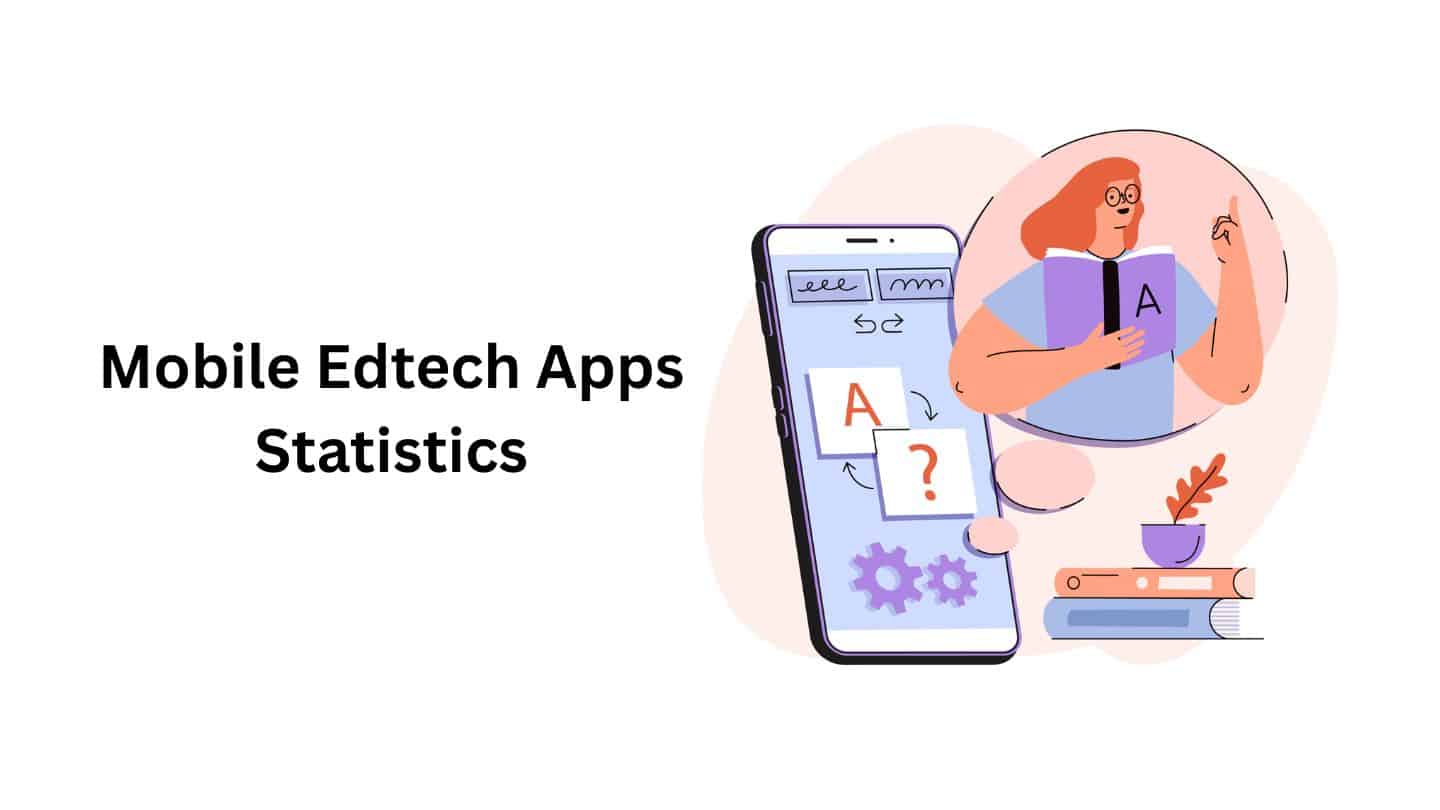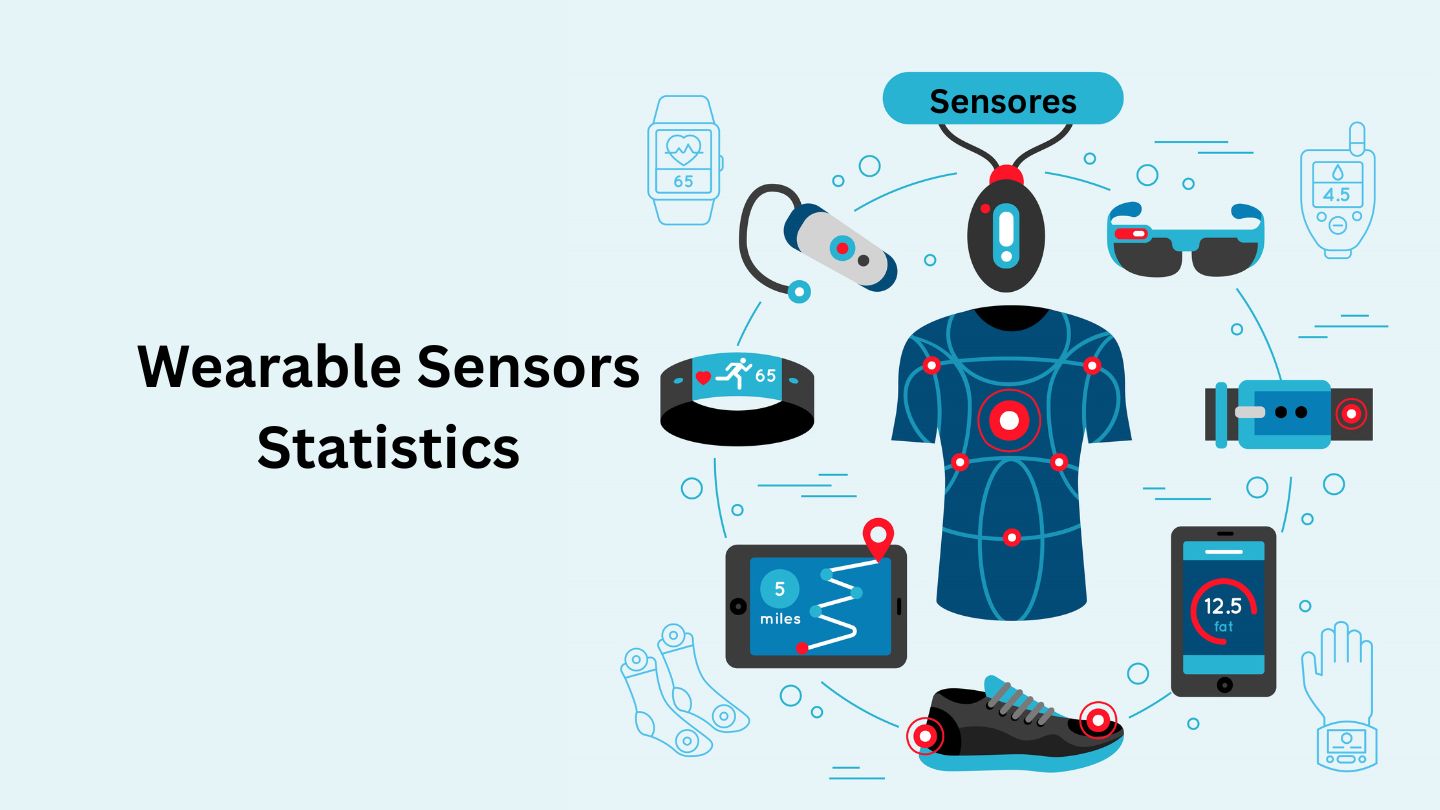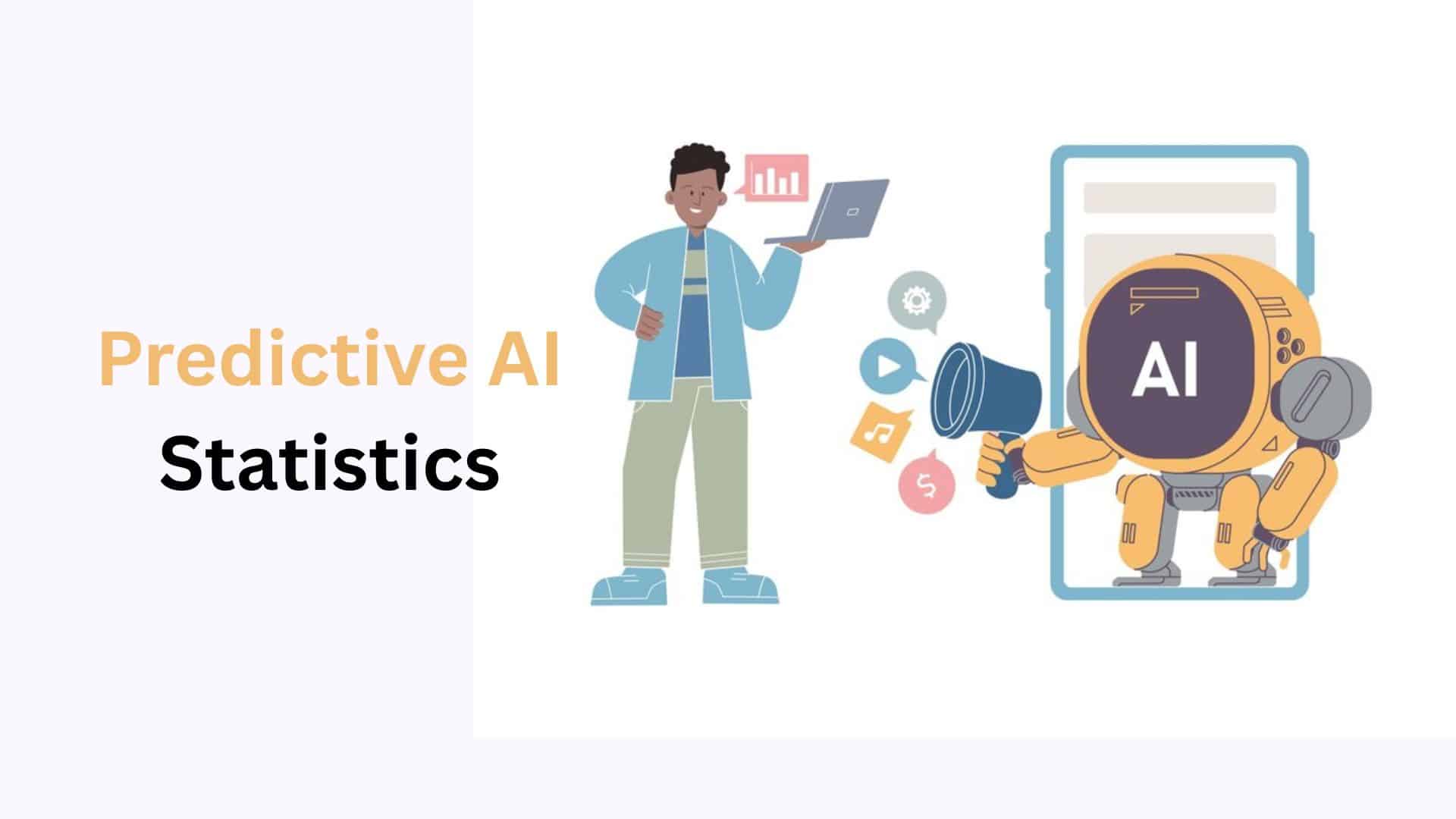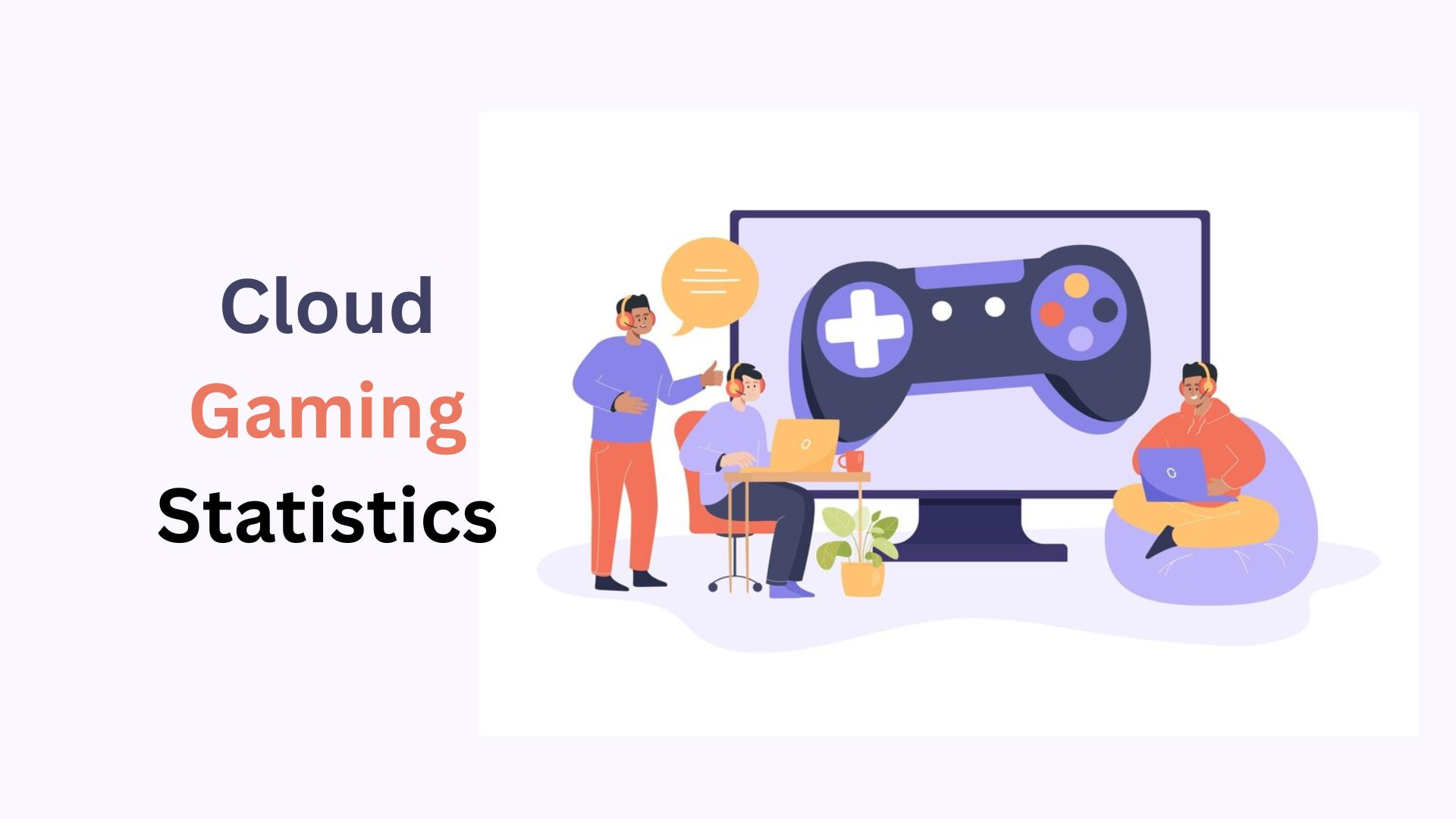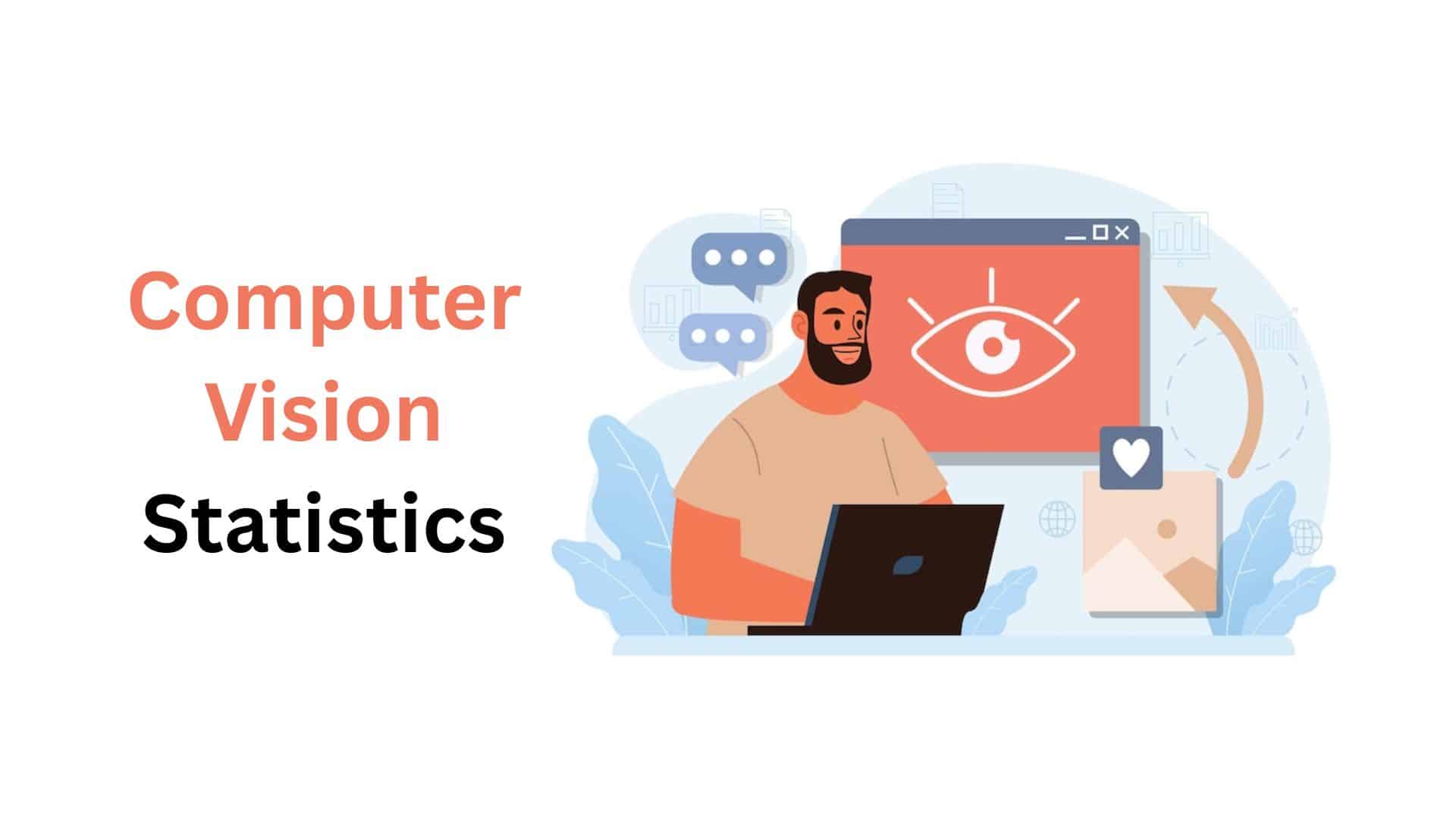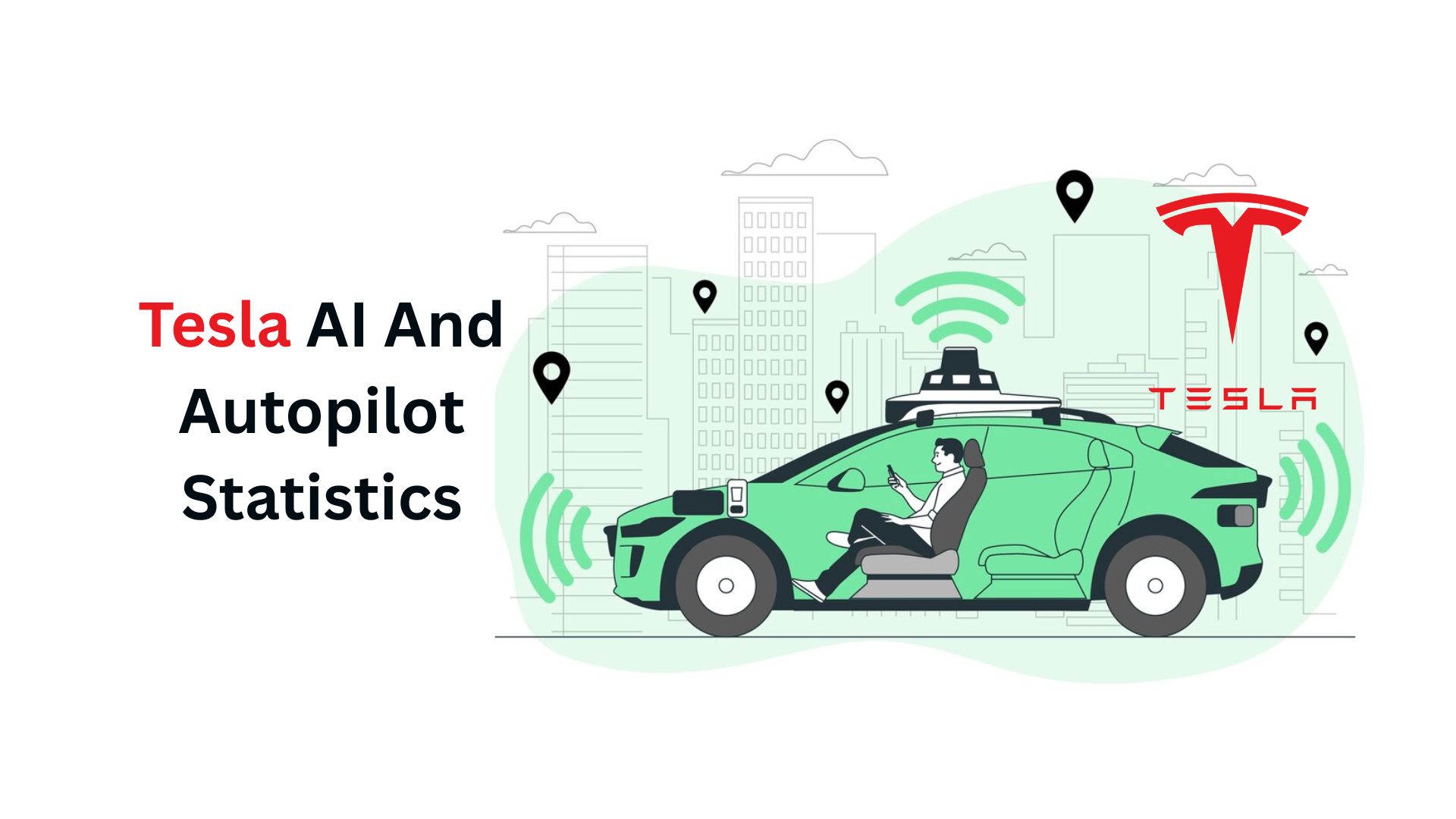AI Agents Statistics, Trends And Facts (2025)

Updated · Apr 23, 2025


TABLE OF CONTENTS
- Introduction
- Editor’s Choice
- What are AI Agents?
- AI Agents Market Size
- AI Adoption in Customer Interaction Statistics
- AI Agents in Specific Industries Statistics
- Use of AI as Chatbot Statistics
- Key Players in the AI Agent Market
- Regional AI Agents Statistics
- AI Agents Job Market Statistics
- Benefits of AI Agents
- Conclusion
Introduction
AI Agents Statistics: AI agents are smart computer programs that handle tasks, make choices, and talk with people or other systems. They use tools like machine learning, natural language processing (NLP), and automation, such as automatic language translation, to collect and study information quickly. This helps save time and boost efficiency.
You’ll often see AI agents used in customer service chatbots, voice assistants like Siri or Alexa, and in areas like healthcare and finance. Their main goal is to make things easier by cutting down on human work and using data to make better decisions based on patterns in how people act. We shall shed enough light on AI Agents Statistics through this article.
Editor’s Choice
- Nearly 50% of customers believe AI agents can be understanding when handling their concerns.
- 70% of customer experience (CX) leaders think chatbots are improving at creating personalized customer journeys.
- 69% of organizations think generative AI can make online interactions feel more personal and human.
- The AI agent market is growing quickly. Experts expect it to reach $47.1 billion by 2030, with a growth rate of 44.8% per year from 2024 to 2030.
- This growth is mainly due to improvements in natural language processing (NLP), machine learning (ML), and the proliferation of IoT devices.
- Virtual assistants could be worth $14.10 billion in the consumer market by 2030, while smart home devices might reach around $537 billion. Healthcare, finance, and retail will be the industries leading in using AI agents.
- North America is still the largest market, holding 40% of the global share, mainly due to big investments in AI research and development.
- Asia-Pacific is the fastest-growing region, with a 49.5% yearly growth rate, driven by digital changes in countries like China, India, and Japan.
- Europe has 15% of the market, focusing on ethical AI and creating regulations to support responsible use.
- A recent IBM and Morning Consult survey showed that 99% of 1,000 developers working on AI applications actively explore or create AI agents.
What are AI Agents?
An AI (artificial intelligence) agent is a computer program that can understand its surroundings, collect data, and take actions independently to reach specific goals set by humans. While people give it a goal, the AI agent chooses the best way to reach it.
For example, an AI agent can help solve customer problems in a contact center. It might ask the customer a few questions, search through company files, and give a helpful answer. Based on the customer’s replies, it decides whether it can solve the problem or needs to send the issue to a human agent.
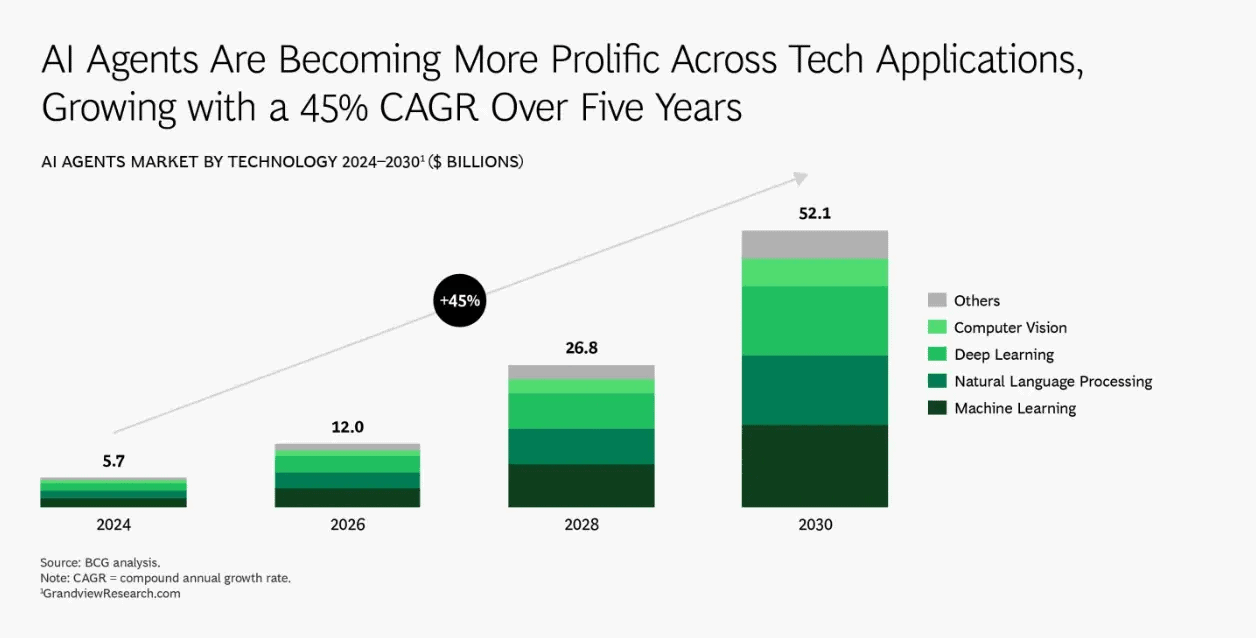 (Source: azilen.com)
(Source: azilen.com)
Most software programs follow specific instructions created by developers to finish tasks. However, AI agents are different from regular software. What makes AI agents special is that they are rational. That means they use the data they collect to make smart decisions and aim for the best results. These agents “sense” their surroundings using either physical tools (like sensors) or digital tools (like customer messages).
For example, a robot collects information from its sensors, while a chatbot listens to customer questions. The AI agent then studies that data to determine what it should do next to meet its goal. It also uses the results of past actions to decide what to do going forward. A good real-life example is a self-driving car. It uses data from different sensors to safely drive around obstacles and stay on the road.
AI Agents Market Size
- The AI agents market is currently valued at about $7.38 billion and is expected to grow fast, with a yearly growth rate of 8%. By 2030, it’s predicted to reach nearly $47.1 billion.
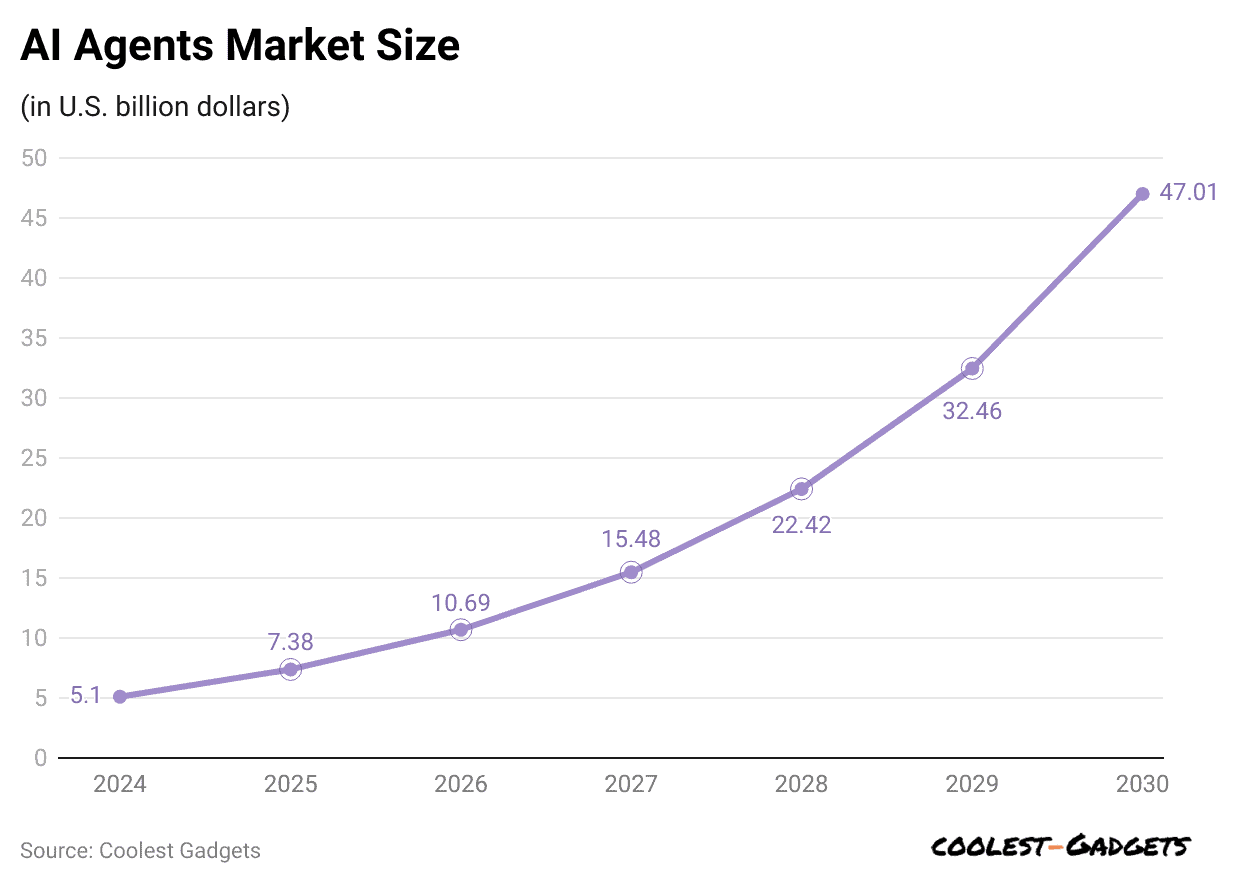 (Reference: sellerscommerce.com)
(Reference: sellerscommerce.com)
| Year | AI Agents Market Size |
|
2030 |
$47.01 billion |
| 2029 |
$32.46 billion |
|
2028 |
$22.42 billion |
| 2027 |
$15.48 billion |
|
2026 |
$10.69 billion |
| 2025 |
$7.38 billion |
|
2024 |
$5.1 billion |
- The AI agents market is growing fast as more businesses use AI.
- New advancements in smart tools like autonomous and generative agents boost this demand.
- Companies like Perplexity AI, Hugging Face, and VoiceFlow are launching user-friendly solutions that make AI easier to work with.
- Major tech firms are investing heavily in AI development, and many companies are now including AI agents in their larger tech systems.
- Also, simple platforms let people without a coding background build their AI agents.
- This makes the technology available to more users and helps drive further market growth.
AI Adoption in Customer Interaction Statistics
- 59% of consumers believe generative AI will change how they interact with companies in the next two years.
- AI Agents Statistics stated that almost 76% of users who have used generative AI have an opinion that it will soon modify their experiences.
- 43% of customers are excited about using generative AI.
- 56% of CX leaders seek new generative AI vendors to improve their customer service tools.
- The customer experience management (CXM) market is expected to grow at 15.8% annually from 2024 to 2030.
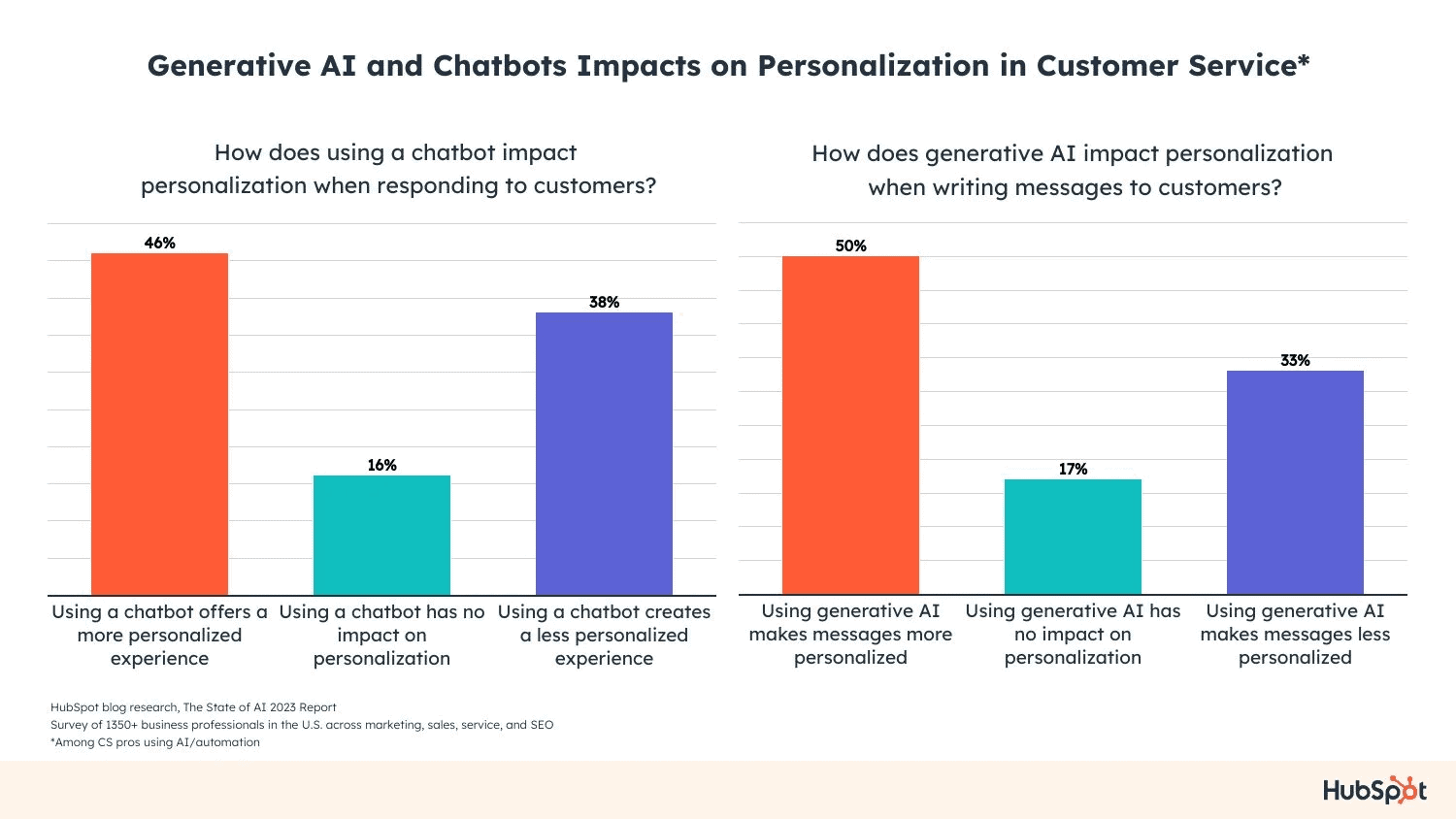 (Source: hubspot.com)
(Source: hubspot.com)
- Tom Eggemeier from Zendesk believes that all customer interactions will soon involve AI, and no human agents will be needed 80% of the time.
- AI Agents Statistics stated that almost 57% of CX leaders think generative AI will greatly impact chat-based customer support in the next two years.
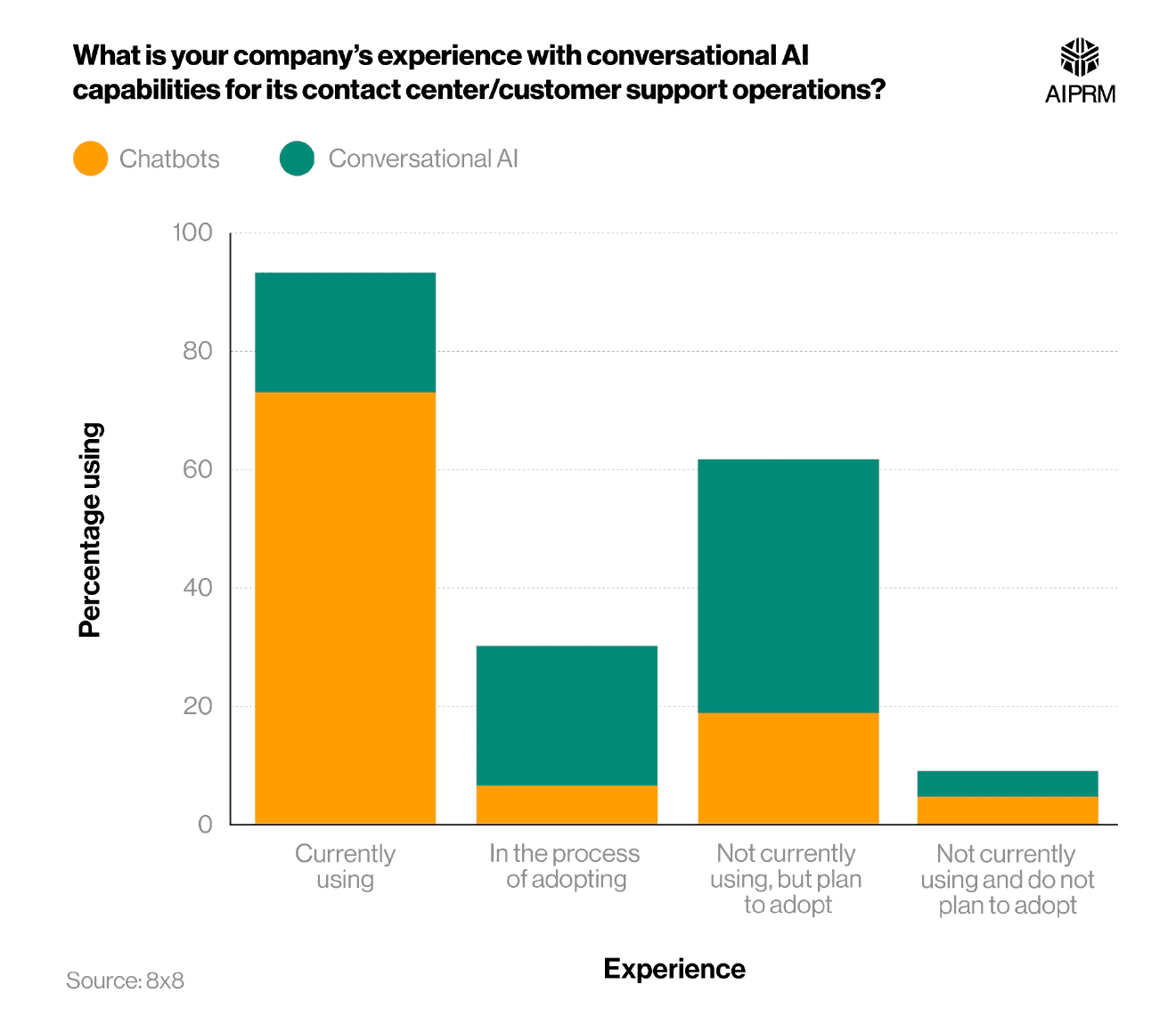 (Source: aiprm.com)
(Source: aiprm.com)
- 62% of CX leaders feel pressure to use generative AI in customer service.
- 64% of CX leaders plan to spend more on AI and related technologies next year.
- 81% of CX leaders who think AI helps improve human intelligence plan to add AI to their agents’ tools next year.
- AI Agents Statistics stated that almost 70% of organizations use tools that automatically capture and analyze customer intentions.
- In the next two years, 42% of CX leaders expect generative AI to affect voice-based customer interactions.
- CX leaders who see a high return on investment (ROI) from their customer support tools are 62% more likely to improve their voice channels using speech analytics, voice AI, and natural language processing.
AI Agents in Specific Industries Statistics
- Deloitte predicts that by 2025, about 25% of companies using generative AI will begin testing AI agents through pilot programs or early projects.
- This number is expected to grow to 50% by 2027. Some industries may use agent-based AI in real operations by the second half of 2025.
- Around 90% of people worldwide said they would interact with an AI agent when dealing with government services.
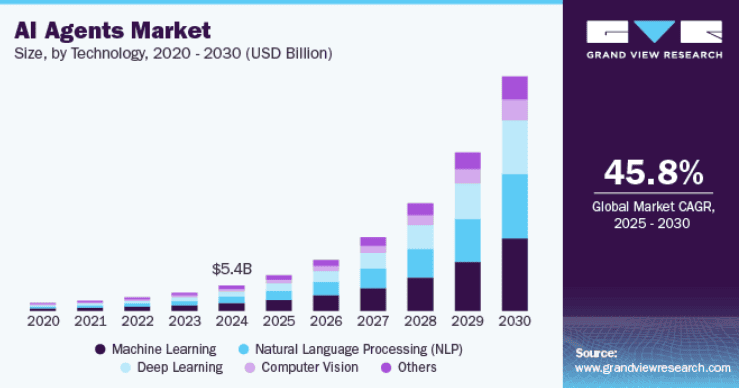 (Source: grandviewresearch.com)
(Source: grandviewresearch.com)
- AI agents allow governments to make services faster and more efficient, helping build trust with the public.
- With tight budgets, AI tools can support government employees and improve services without hiring more workers.
- AI agents are also gaining attention in schools and colleges.
- 77% of students said they would use AI agents to help with academic processes.
- AI Agents Statistics stated that almost 60% would talk to an AI agent if it gave quick and correct information.
- AI now helps students handle about 25% of their school tasks.
- 83% of school administrators said they are open to using AI agents to help them in their jobs.
- By 2025, about 90% of hospitals are expected to start using AI agents. These tools will help improve patient care by predicting health issues early and automating tasks.
- Nearly 69% of retailers that use AI agents have seen major increases in sales thanks to better customer targeting and forecasting.
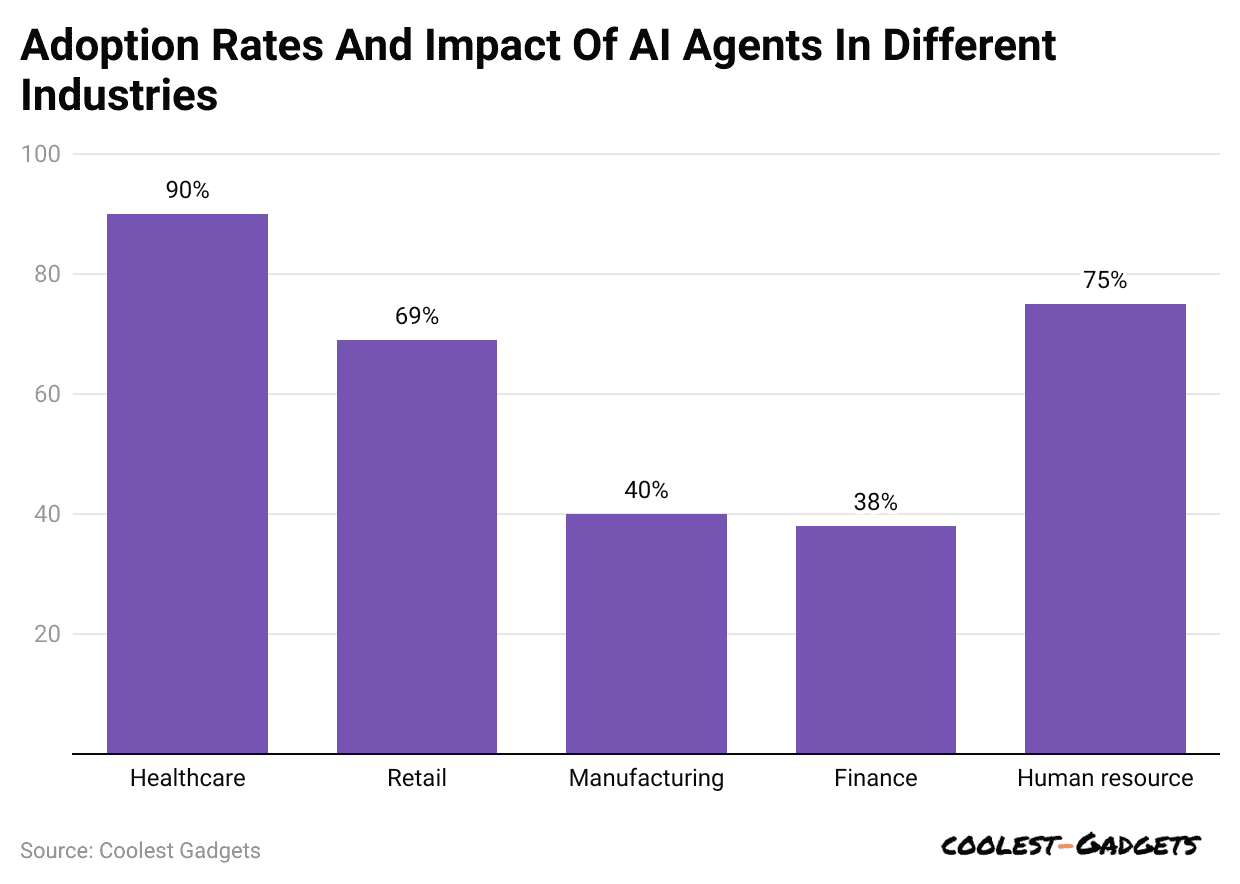 (Source: allaboutai.com)
(Source: allaboutai.com)
- In factories, AI-powered systems for predicting machine issues have reduced equipment downtime by 40%, helping companies save on repair expenses.
- Banks and other financial firms have boosted their profits by 38% using AI agents to spot fraud and manage risk more effectively.
- AI agents now help screen resumes faster, reducing the time it takes by 75%, which allows HR teams to focus on bigger-picture tasks.
Use of AI as Chatbot Statistics
- AI Agents Statistics stated that almost 49% of U.S. adults talked to an AI-powered chatbot for customer support in the past year.
- 7% of businesses often use IT help desk chatbots to deal with basic questions.
- In 2023, about 75% of U.S. business owners said AI, including chatbots, improved customer service through fast messaging.
- 44% of companies plan to start using AI chatbots in the next 2 years — a 132% jump.
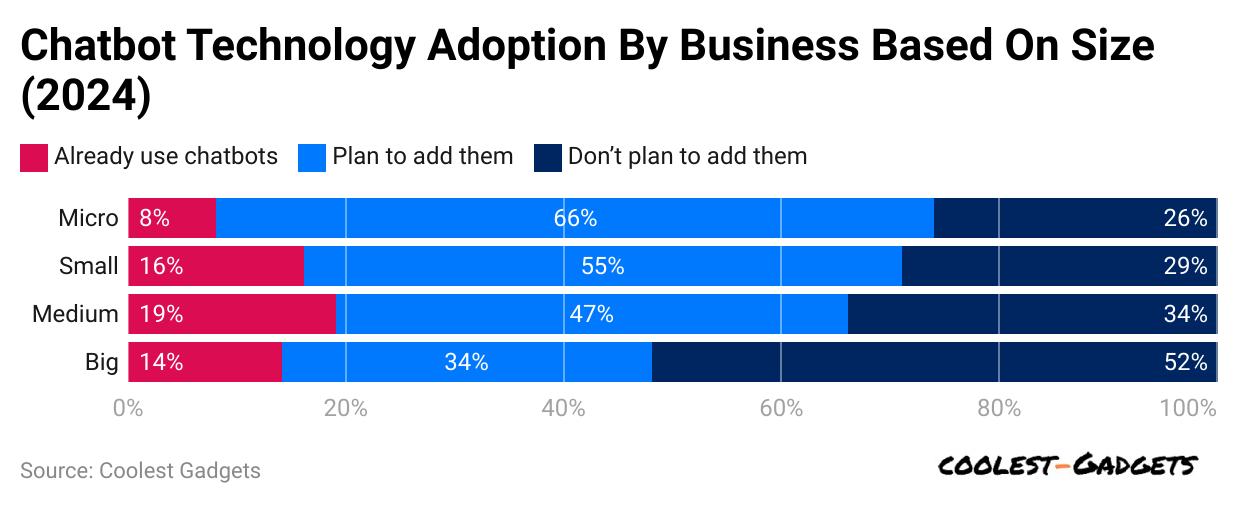 (Reference: tidio.com)
(Reference: tidio.com)
- 36% of marketing managers already use chatbots and AI tools for customer help, and another 20% want to add them in the next 6 months.
- AI Agents Statistics stated that almost 34% of customers find chatbots useful, but 43% think there’s still much to improve.
- By 2027, 25% of businesses expect chatbots to be their main way of helping customers.
- Chatbots might save companies up to 2.5 billion work hours by the end of 2024.
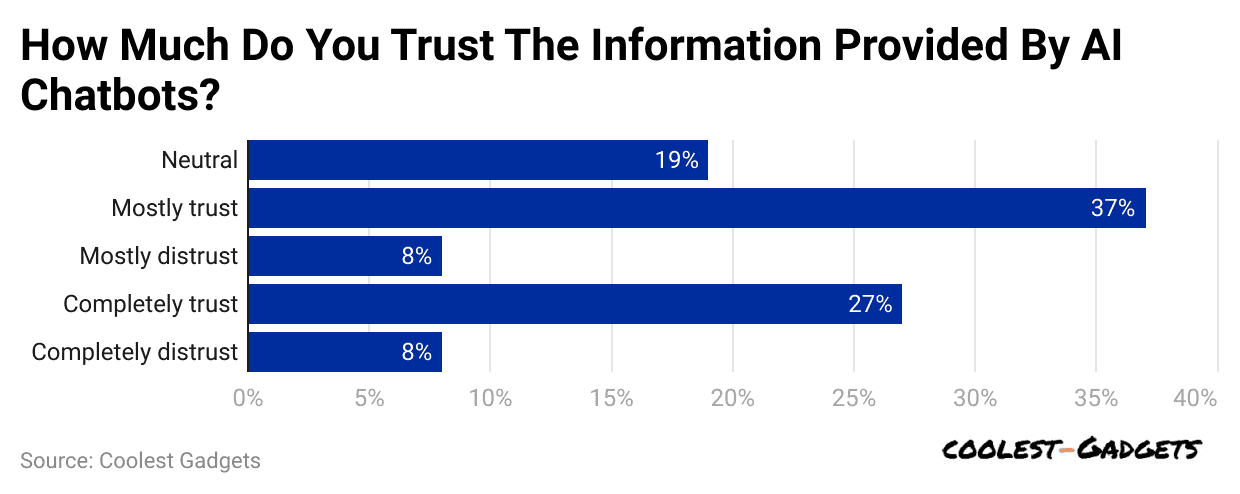 (Reference: tidio.com)
(Reference: tidio.com)
- AI chatbots can handle up to 80% of customer tasks and questions.
- 75% of users say chatbots don’t handle complicated problems well and often give wrong answers.
- The success rate of solving problems through chatbot changes is only 17% for billing issues but up to 58% for returns or cancellations.
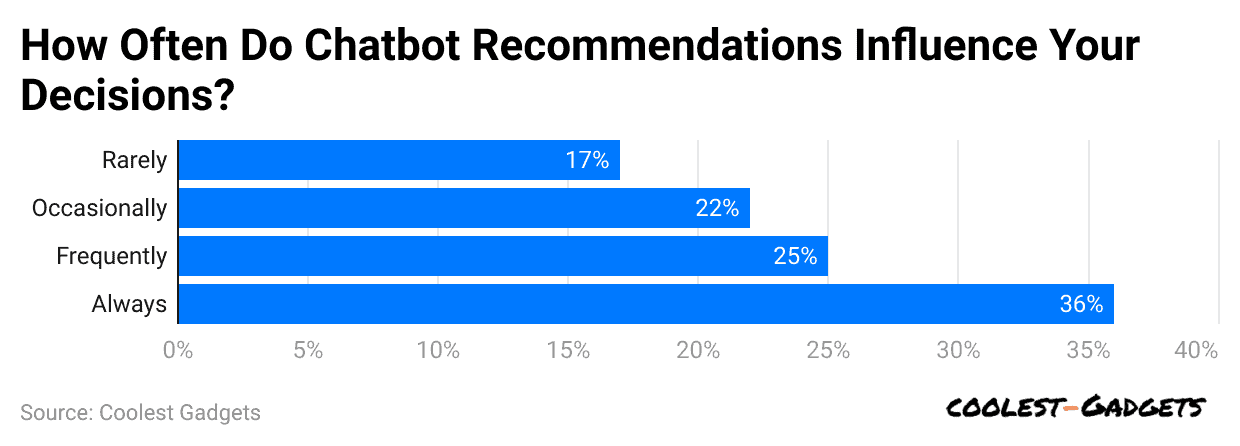 (Reference: tidio.com)
(Reference: tidio.com)
- AI Agents Statistics stated that almost 85% of people still need human help for most customer service issues.
- Still, 35% of users believe chatbots can solve their problems well.
- Overall, AI chatbots are helping businesses save time and serve customers faster, but they still need to improve their ability to solve complex problems.
Key Players in the AI Agent Market
Several big tech companies and newer startups are leading the way in the AI agent industry in 2025. Here are the main companies shaping this field:
- Google uses its AI agents, such as Google Assistant and Gemini (previously Bard), in both consumer and business software. The company plans to spend $75 billion on AI research and development by 2025.
Microsoft
- Microsoft’s Azure AI platform and Copilot AI agent help businesses automate tasks and improve productivity. The company has teamed up with OpenAI to improve its tools with AI features.
IBM
- IBM’s Watson remains a top player in business AI, offering solutions for sectors like healthcare, finance, and customer service. In 2023, IBM made 38% more revenue from AI-related projects than from those without AI.
Amazon
- Amazon is driving growth in consumer and cloud markets with its AI-powered Alexa and AWS services. The company also introduced Amazon Q, an AI agent designed for business use.
Startups
- Startups like Anthropic, Cohere, and Hugging Face are exploring AI agent technology, focusing on ethical AI and providing open-source solutions.
Regional AI Agents Statistics
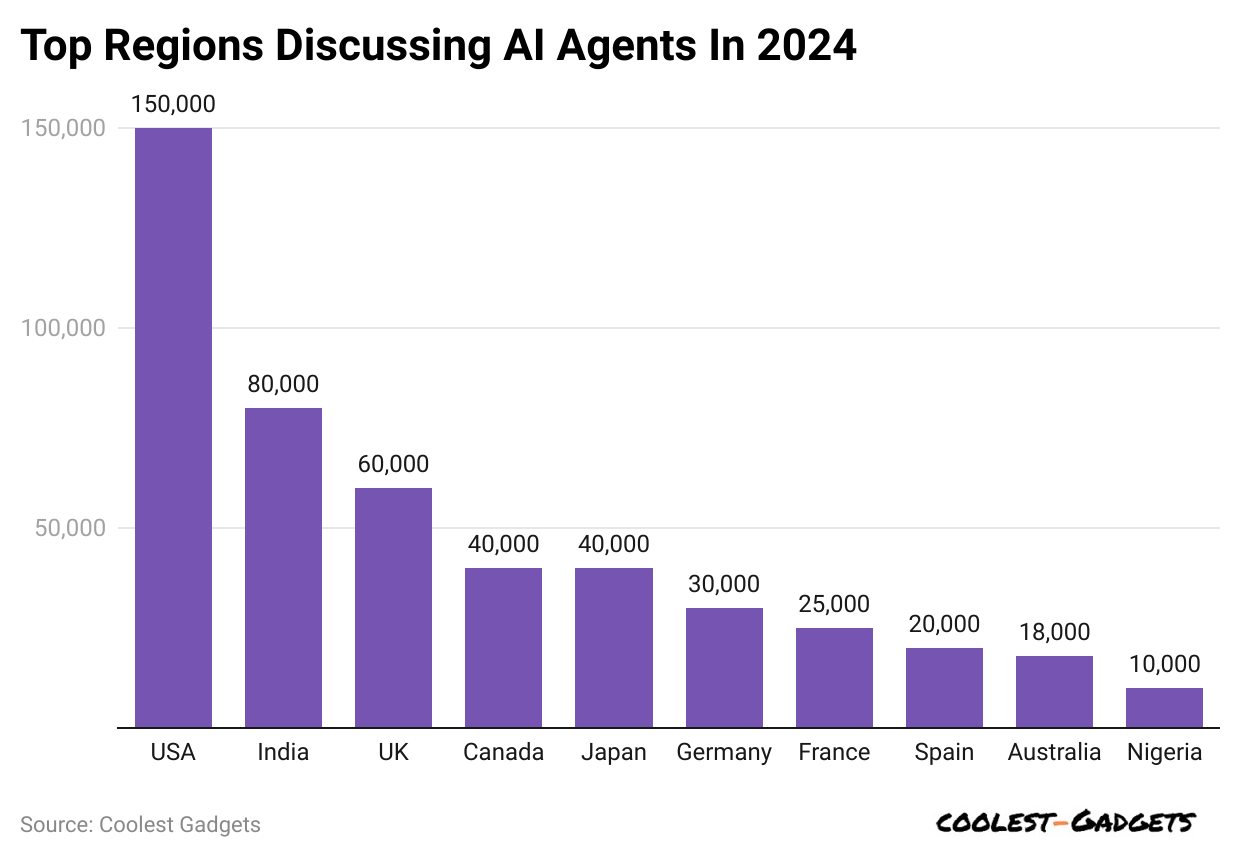 (Reference: allaboutai.com)
(Reference: allaboutai.com)
- United States: The U.S. is leading global discussions about AI agents, with more than 150,000 mentions. This shows a strong level of interest and public involvement in AI-related topics.
- India: India has around 80,000 mentions, showing growing interest and attention to how AI is being used and developed.
- United Kingdom: The UK recorded nearly 60,000 mentions, indicating solid public engagement with AI agent trends.
- Canada: With about 40,000 mentions, Canada shows strong interest and active participation in conversations about AI.
- Japan: Japan also had around 40,000 mentions, highlighting its active focus on AI technologies and their use across industries.
- Germany: Germany reached roughly 30,000 mentions, showing ongoing public curiosity and interest in AI-driven tools and solutions.
- France: France had about 25,000 mentions, reflecting steady involvement in AI discussions and growing awareness.
- Spain: Spain logged around 20,000 mentions, suggesting meaningful conversations and interest in AI innovations.
- Australia: With nearly 18,000 mentions, Australia is actively discussing the role and possibilities of AI agents.
- Nigeria: Nigeria reached around 10,000 mentions, showing increased interest and early growth in AI adoption.
These numbers are based on data from social media platforms like X (formerly Twitter), Reddit, Instagram, and others, giving a broad look at how people worldwide talk about AI agents.
AI Agents Job Market Statistics
- Influenced by market trends in 2024, AI agents are changing the job market by automating tasks and creating new job opportunities. As AI-powered agents become more popular across different industries, they’re making a big impact on employment:
- Job Automation: AI agents are expected to automate up to 300 million jobs in major economies (BCC, 2023).
- Job Creation: While automation presents challenges, AI is also expected to create 97 million new jobs by 2025, showing that AI technologies can replace some roles and open up new ones.
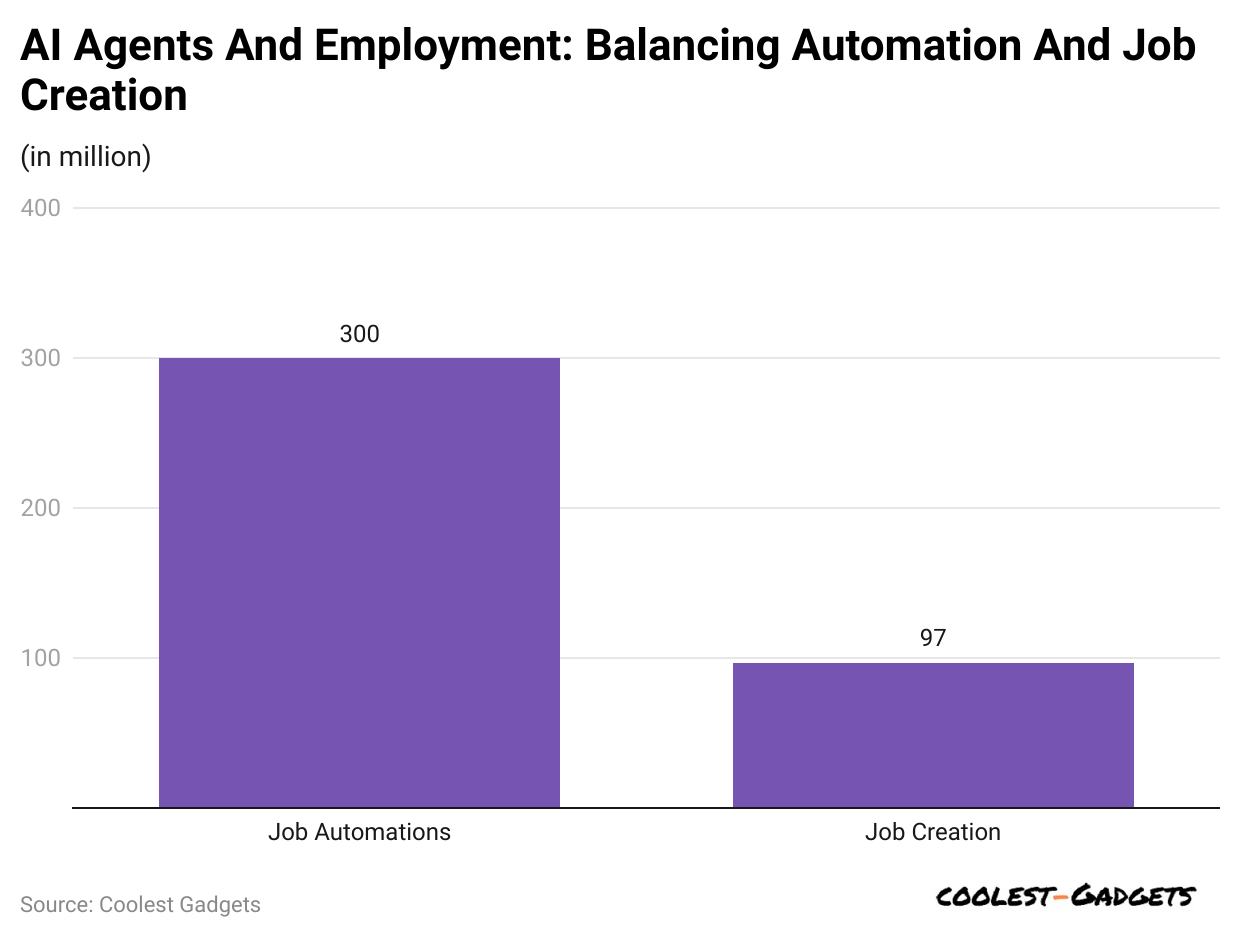 (Reference: allaboutai.com)
(Reference: allaboutai.com)
- Workforce Adaptation: Twenty-five per cent of companies are turning to AI agents to help solve labor shortages and improve employee skills.
- Job Market Changes: Because AI agents are affecting the job market, 23% of jobs are expected to see turnover.
- Solving Labor Shortages: 55% of businesses are using AI agents to help deal with labor shortages.
Benefits of AI Agents
Boosted Productivity
- AI agents are smart tools that can perform tasks independently without human intervention. Companies use them to meet goals and get work done faster. When teams hand off routine or boring tasks to AI agents, they can focus more on important and creative work that brings real value.
Lower Costs
- Using AI agents helps reduce costs caused by slow steps, human mistakes, or manual work. These agents follow a steady plan and can adjust to new situations, helping businesses handle tough jobs more easily and efficiently.
Smarter Decisions
- AI agents powered by machine learning (ML) can collect and study large amounts of live data. This helps business leaders make quick and accurate decisions. For example, AI agents can study product demand across different markets when launching a new ad campaign.
Better Customer Service
- Today’s customers want fast, helpful, and personalized service. With AI agents, businesses can recommend the right products, answer questions quickly, and give a smooth experience that keeps customers returning and increases brand loyalty.
Conclusion
In summary, AI agents quickly change industries and how businesses run worldwide. The AI agents market is growing fast, and it’s expected to reach $47.1 billion by 2030. Companies use AI to automate tasks, improve customer service, and solve workforce problems. Industries like healthcare, retail, finance, and HR already use AI agents to work more efficiently, cut costs, and boost innovation.
As more businesses adopt AI, it will keep advancing and help companies make better decisions. AI agents are improving business operations and creating new job opportunities and challenges. The future looks set for AI to become even more important in shaping business success and employee roles. We have shed enough light on AI Agents Statistics through this article.
Sources
FAQ.
Our AI agents can manage many customer inquiries but are meant to assist human agents, not replace them. They’re great at handling basic tasks and solving simple problems, which lets human agents focus on more complicated issues that need a personal touch.
A use case is the main business problem or goal you want to address. It’s the reason, or “why,” you’re using AI agents. An agent is the “who”—the virtual worker that carries out specific tasks to help solve the use case. Tools are the actions or methods that AI agents use to complete their tasks and achieve their goals.

Saisuman is a talented content writer with a keen interest in mobile tech, new gadgets, law, and science. She writes articles for websites and newsletters, conducting thorough research for medical professionals. Fluent in five languages, her love for reading and languages led her to a writing career. With a Master’s in Business Administration focusing on Human Resources, Saisuman has worked in HR and with a French international company. In her free time, she enjoys traveling and singing classical songs. At Coolest Gadgets, Saisuman reviews gadgets and analyzes their statistics, making complex information easy for readers to understand.


